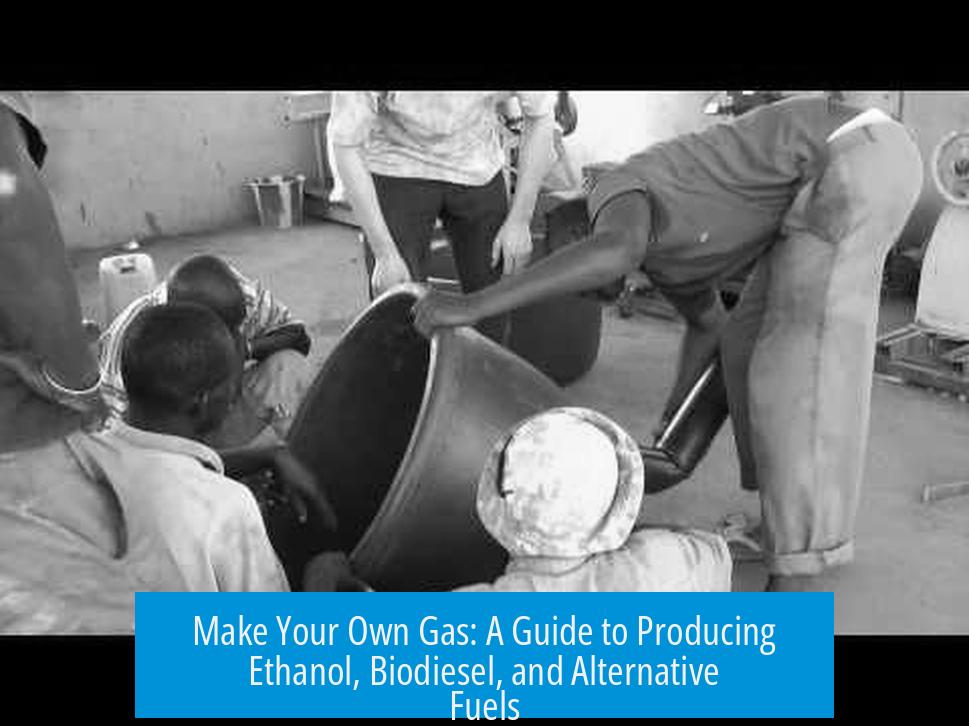How to Make Your Own Gas
Making gasoline at home is theoretically possible but practically very difficult due to the complexity, cost, and equipment needed. Instead, producing biodiesel or using alternative methods to create fuel is more feasible for individuals.
Gasoline Production: From Ethanol to Alkanes
One theoretical route to produce gasoline involves several chemical steps starting with ethanol:
- First, ethyl alcohol (ethanol) is brewed and purified to 100% concentration.
- Next, ethanol undergoes acid dehydration to form ethylene gas.
- Ethylene is then polymerized under heat and pressure to create alkane chains like octane.
- These alkanes are components of gasoline.
This multi-step process is chemical-intensive and requires strong acids, precise distillation, and high-pressure reactors. The time, cost, and technical ability needed make it impractical for home-scale or hobby production.
Biodiesel: The Practical DIY Fuel
Biodiesel production offers a simpler alternative. It uses vegetable oils or animal fats and converts them chemically through transesterification into fatty acid methyl esters (FAME). These esters can fuel diesel engines effectively.
Key advantages include:
- Relatively simple chemical process accessible to non-professionals.
- Wide availability of raw materials such as used cooking oils or plant oils.
- Diesel engines are more flexible and tolerant of different combustible liquids.
Biodiesel synthesis requires some chemicals like methanol and a base catalyst (e.g., sodium hydroxide) but does not demand extensive industrial infrastructure.
Alternative Fuel Production Methods
Fuel from Ethanol or Methanol
Converting vehicles to run on ethanol or methanol is more straightforward. Both fuels are easier to produce and handle than synthetic gasoline. Small-scale fermentation can supply ethanol, and methanol can originate from gasification of biomass.
Gasification of Wood and Biomass
Gasification involves heating organic matter like wood in low-oxygen conditions to produce a combustible gas mixture called producer gas. This gas can power internal combustion engines designed or adapted to burn it.
Pyrolysis of Plastic Waste
Pyrolysis thermally decomposes plastics to yield oil-like liquids, gases, and char. The liquids can function as crude oil substitutes after further processing. However, this method requires specialized setups for distillation and chemical handling.
Historical and Synthetic Fuels
During World War II, Germany developed synthetic fuels (“synfuels”) by converting coal and other carbon sources into liquid fuels suitable for diesel engines. Modern companies aim to refine such processes to produce carbon-neutral fuels.
Fuel Blending Techniques
Partial gasoline can be formulated by blending about 10% ethanol with light hydrocarbons. Anti-knocking agents are necessary to prevent engine performance issues. Some engines are designed to tolerate high percentages of ethanol fuel, but these are specialized.
Storage and Realistic Mobility
Storing crude oil can simplify fuel production in emergencies but limits portability. Making fuel is only one piece of mobility; maintenance needs such as parts replacement and battery upkeep must also be considered. Alternative transportation options like bicycles or horses can offer practical solutions.
Practical Advice and Warnings
While diesel and biodiesel are well within reach for DIY enthusiasts, gasoline synthesis at home risks complexity and safety issues. Attempts to produce gasoline via unconventional means face substantial challenges and have historical precedents of failure. Proceed cautiously and with realistic goals.
Key Takeaways
- Gasoline production from ethanol requires multiple complex steps, making it impractical at home.
- Biodiesel synthesis from vegetable oil is accessible and effective for diesel engines.
- Alternative methods like gasification and pyrolysis provide fuel options but involve complex equipment.
- Vehicle conversion to ethanol/methanol fuel is simpler and more economical than gasoline production.
- Storing crude oil aids fuel creation but limits mobility and requires resources for vehicle maintenance.
- Caution is necessary; DIY gasoline production carries significant challenges and risks.





Leave a Comment